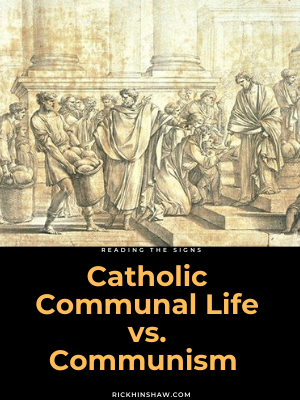“Those who believed shared all things in common; they would sell their property and goods, dividing everything on the basis of each one’s needs.”
Thus does the Acts of the Apostles describe the “communal life” of the early Christians. “None of them ever claimed anything as his own; rather, everything was held in common.”
This, I think, is the root of the attraction some Catholics feel toward the communist ideal: what we might call the “commune-ism” of the early Church, as distinct from modern day communist systems. Indeed, Catholics drawn to the communist ideal will point out that “true communism” has never actually existed on a large scale, national level. I would submit that it never will, because it never can.
The communal approach of the early Church is easily seen as the Christian ideal. It has flourished, in various forms, throughout the history of Catholicism, in monastic life, among certain religious orders, in some lay movements and communities.
It works for several reasons: it is voluntary, the communities are small, and all who participate believe in and are committed to its ideals.
And these are precisely the reasons that large scale, government-imposed communist systems do not work—and are morally unacceptable.
They deny human freedom. One does not have to be a “greedy capitalist” to want one’s own property—to be in business for oneself, to work one’s own land, or just to have a home for one’s family.
As Pope Leo XIII made clear in Rerum Novarum, his seminal encyclical on Catholic social teaching, the Church upholds the right of the individual to own property as the just fruits of one’s labor. We are all free to voluntarily give away what we have, or decline to possess anything of our own. And yes, our Church teaches that we ought not hoard more than we need, while others suffer from want. But it is morally wrong for a coercive government to dispossess us of what is rightfully ours, to force us into a communal way of living that we do not choose for ourselves.
The vastness and diversity of large-scale communist societies also make them unworkable and morally problematic. It is one thing for a small group of like-minded people to come together voluntarily in a commune, all holding the same beliefs and values and agreeing to the same rules and practices, the appropriate use of their shared resources, and the relinquishing of personal freedom and individual possessions. It is quite another thing to force together an entire nation of diverse people, with different values, different religious beliefs, different priorities in their lives, require them to surrender any freedom to act according to their beliefs, values, and priorities, and deny them the discretion to use the resources they have earned in furtherance of those beliefs, values, and priorities. This disincentivizes productivity, making large-scale communist systems economically deficient as well.
Finally, the accumulation of power necessary to impose a communist system on an entire national population virtually guarantees that those holding such power will not relinquish it in order to live as “equals” among those over whom they have imposed their will.
This is especially true when they have followed the Marxist formula for establishing a communist system: violent revolution, followed by brutal, merciless suppression of all dissent. This, Marx wrote, is absolutely essential to reaching the ultimate goal: a classless society in which all are equal.
Yet, across more than a century of communist revolutions in virtually every corner of the globe, not one has ever attained that goal of classless equality.
“Power tends to corrupt,” Lord Acton said, and “absolute power corrupts absolutely.” We see even in a democracy, where there are constitutional limits to power, how difficult it is for the political class to limit or relinquish its powers, or to resist temptations to abuse those powers for personal gain.
How much more so when power has been obtained, secured, and made absolute through violent revolution and ruthless suppression of dissent. What moral compunction is left, for those who have already slaughtered millions of their own people and banished millions more into their gulags, to suddenly relinquish power, eschew the accumulation of material wealth, and reduce themselves to equality with the masses?
Communal living, among small groups of people with shared beliefs and values who come together freely and voluntarily, remains a Christian ideal. (Though not an obligation. Catholic social teaching allows for varying prudential judgements as to how best to organize one’s life and economic activity in service to our own needs and the common good.)
Large scale communist societies pervert the communal ideal, through brutal suppression of freedom, imposition of beliefs not shared by the entire population, and resulting economic deficiencies that only increase, rather than alleviate, human suffering.
As such, they are incompatible with Catholic moral and social teaching.

Rick,
Thank you for this introspective.
I remember my father referencing Orwell’s Animal Farm where one said of the proposed plan for forced collectivism:
“All are equal but some are more equal than others”.
LikeLike
Thanks, Walter. Orwell’s writing brilliantly indicted the evils of totalitarian communism.
LikeLike
Thanks, Rick.
We cannot tire of warning against the dangers of Communism.
While it is unfashionable in certain circles today, it is never more needed than now.
All the best!
Msgr. B
LikeLike
Thanks, Monsignor. Yes, with China the leading existential threat to our world, and generations of young people woefully uneducated about the horrific reality of life under communism, we need to continue to sound the alarm.
LikeLike